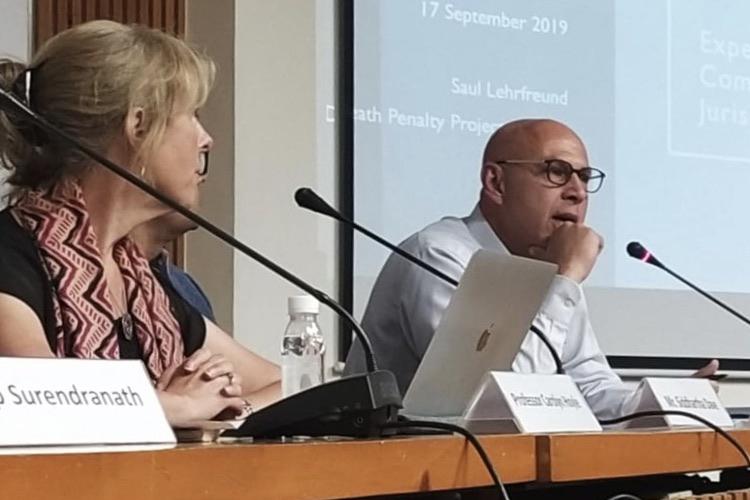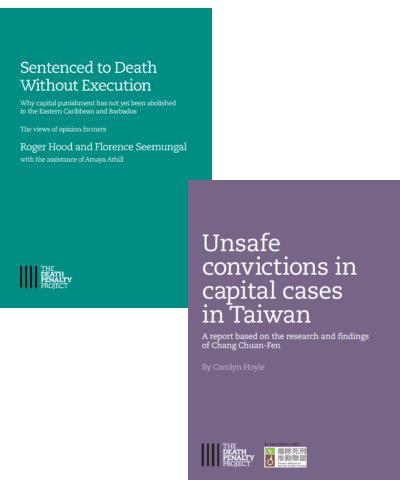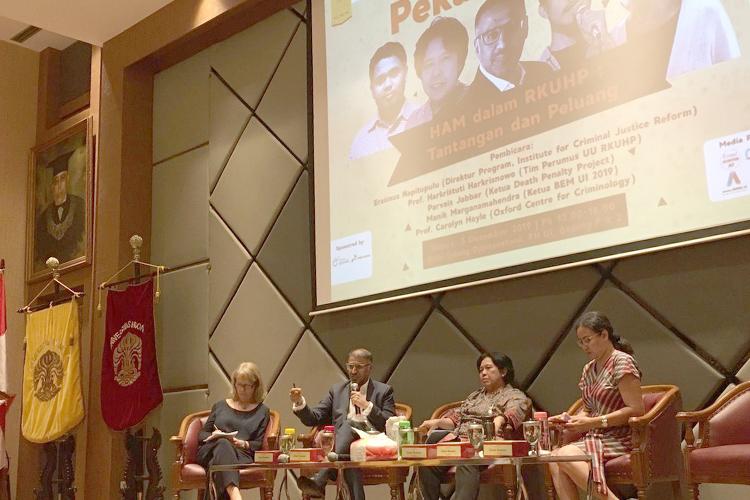Announcing the Death Penalty Research Unit (DPRU) at the Centre for Criminology
The Centre for Criminology is pleased to announce the creation of the Death Penalty Research Unit (DPRU), following a generous donation from Lady Edwina Grosvenor. The DPRU (to be officially launched in October 2020), will be led by Professor Carolyn Hoyle, working closely with academics, practitioners and civil society organisations around the world.
Posted
Time to read
Part of the Oxford Centre’s Global Criminal Justice Hub, the DPRU will build on decades of death penalty research at the Centre, which began with the work of Professor Roger Hood, a leading death penalty scholar, who was until his retirement in 2003, Director of the Centre. It aims to:
(a) develop empirical, theoretical and policy-relevant research on the death penalty worldwide;
(b) encourage death penalty scholarship including at graduate level, through education, events, research dissemination and an active blog; and
(c) engage in knowledge production, exchange and dissemination in cooperation with civil society, charities, legal practitioners and local academics in those countries where research is ongoing.
It will focus on the retention, administration and politics of the death penalty worldwide, seeking to understand the rationales for the death penalty, how it is used in practice, and its diverse application and impact on communities.

Collaboration with partner organisations and academics around the world on the production and dissemination of empirical and theoretical knowledge will be central to the work of the DPUR.
The Oxford team is currently working with NGOs around the world including LBH Masyarakat, Indonesia; Justice Project, Pakistan; Harm Reduction International; Veritas, Zimbabwe; and engages in collaborative endeavours with Amnesty International, ADPAN (Anti-Death Penalty Asia Network); We Believe in Second chances, Singapore; Capital Punishment Justice Project, Australia; and the Abdorrahman Boromand Center, which focuses on human rights in Iran.
The DPRU also collaborates with academics in various countries; including at the Capital Punishment Impact Initiative Australia; Project 39a, India; Dhaka Law School in Bangladesh; and the Faculty of Law and the Department of Criminology at the University of Indonesia and AIDS Research Centre, Atma Jaya Catholic University of Indonesia.
However, the DPRU’s main partner is the London-based legal charity, The Death Penalty Project (The DPP), which has for 30 years engaged in litigation, capacity building and research on the death penalty in over 30 countries.
Collaborations with the DPP
Since 2004, when Roger Hood became an academic consultant to The DPP, he has conducted a series of studies, starting in 2006 with research on the mandatory death penalty in Trinidad and Tobago. Since then, he and Carolyn Hoyle have worked with The DPP on reports on the Caribbean, Africa, and Asia, addressing public opinion on the death penalty, the views of ‘opinion formers’, sentencing, and wrongful convictions.

Masters and DPhil students will continue to participate in research as part of the DPP-Oxford Criminology Research Internship Programme. To date, they have produced reports on women on death row in Africa and Asia and on death penalty appeals at the Privy Council. Lucy Harry’s DPhil project seeks to understand women’s pathways to drug offending in Malaysia and their experiences of death row, while Amelia Inglis’ work on the experiences of victims of capital crimes in the US seeks to understand how the protracted appeals process can militate against recovery for those whose defendants are sentenced to death. Chloe Deambrogio’s work on the death penalty in the US adopts an historical approach, considering the changing landscape of scientific evidence in capital cases in Texas, one of many doctoral projects focused on the death penalty in the US supervised by Carolyn Hoyle over the past two decades.
In October 2020, new Oxford Criminology DPhil student, Lucrezia Rizzelli will start her project on deterrence, drugs and the death penalty in Indonesia as part of an ESRC collaborative studentship. Co-supervised by Carolyn Hoyle and fellow Oxford criminologist, Katrin Mueller-Johnson, and Parvais Jabbar of The DPP, she will work closely with Dr Claudia Stoicescu, a Research Associate of the Centre for Criminology, and the University of Atma Jaya, Indonesia. Her work will contribute to a larger programme of deterrence scholarship being led by The DPP, which could be replicated across other Southeast Asian jurisdictions. Later this year, Carolyn Hoyle and Parvais Jabbar will conduct a pilot study of prisoners in Jakarta to prepare for Lucrezia’s research, with assistance from Claudia Stoicescu and Ricky Gunawan (former Director of LBH Masyarakat).
A focus on Asia, Africa and the Caribbean
Though the DPRU team will be international in its reach, including all jurisdictions that retain the death penalty, particular attention will be paid to Asia and to the Commonwealth countries of Africa and the Caribbean where there are fewer due process protections and retention for crimes that are not typically thought of as the most serious and where many more women and foreign nationals are exposed to the death penalty than, for example, in the US.
Carolyn Hoyle and Lucy Harry will continue their research on foreign nationals at risk of capital punishment across South and Southeast Asia. Working with The DPP and the Capital Punishment Impact Initiative at Monash University in Australia, their research will develop theoretical and empirical accounts of citizenship and gender alongside of other sites of disadvantage and discrimination.
The DPRU has recently received funding from the ESRC (Impact Acceleration Account) to collaborate with a team of human rights NGOs around the world to establish, develop and maintain an interactive database of information on foreign nationals sentenced to death in Asia and the Middle East. This collaborative database will record and provide access to accurate and up to date information on the prevalence and frequency of death sentences for, and executions of foreign nationals. Aggregate data will include their nationality, gender, the crimes that they are convicted for and the countries they are detained in under sentence of death or where they were executed. This resource will provide civil society with the tools to effect change for this vulnerable population.
The DPRU and the DPP is currently planning work on elite opinion research in Taiwan, as part of a broader programme of research conducted by The DPP, working with Taiwan Alliance to End the Death Penalty and Soochow University, Taipei.

In all of these countries, there is little scholarship on the death penalty and DPRU’s commitment to working with local academic and civil society partners can help to build capacity for research and engagement that could have an impact on the retention and administration of capital punishment. By building on partners’ research aspirations, training ‘local’ researchers, and sharing in the production and dissemination of outputs, they will seek to ensure that their research has an impact on governments, civil society, legal practitioners, organisations that support women and migrants, and those who are subject to criminal justice systems. The DPRU is not only aimed at elucidating the law and practice of capital punishment worldwide, but at challenging it, with the explicit aim of abolition or, failing that, progressive restriction.
Share